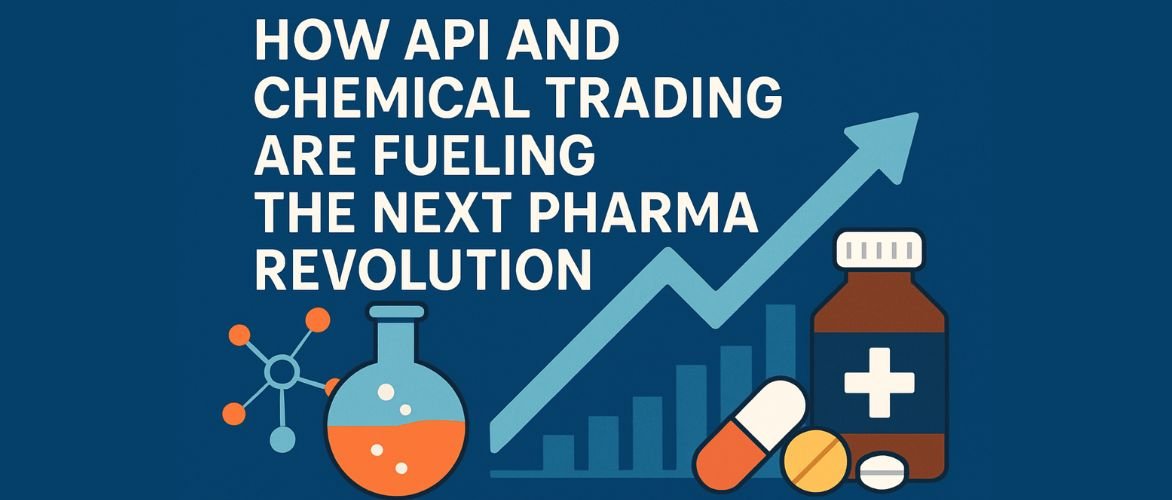Driving Innovation: How API and Chemical Trading Power the Pharma Revolution
Over the past few years, the pharmaceutical industry has undergone massive changes. Even as the spotlight on drug innovation, biotechnology and regulatory developments has been a major attraction, there has been a more subtle but high-powered revolution going on behind the scenes, the turnaround in strategic Active Pharmaceutical Ingredient (API) and chemical trade. With globalisation and digitisation of distribution channels and supply chain diversification transforming the pharma industry and parent organisations, API and chemical trading are becoming the key drivers of the next pharmaceutical revolution.
What Are APIs and Chemical Trading?
APIs are those components of drugs that are biologically active and which elicit the required therapeutic effects. Chemical trading is the supply and sale of raw materials and intermediates by which such APIs and finished formulations are created.
Together, they:
- Enable scalable drug manufacturing
- Support efficient supply chain management
- Enable access to speciality chemicals for research and development and production
- Connect manufacturers, suppliers, and pharmaceutical companies globally
The Globalisation of Pharma Supply Chains
The industry of pharmaceuticals has been through several transitions to switch towards a decentralised transnational supply chain. Such countries as India and China have become the key producers of APIs.
Key impacts of this globalisation:
- Cost efficiency through offshore manufacturing
- Greater accessibility to a greater range of raw materials
- Specialised expertise from contract manufacturers and traders
- Faster go-to-market timelines due to better supply chain dynamics
The Rise of Digital API & Chemical Trading Platforms
Technology is accelerating the pace and efficiency of trading. Platforms like Molport, ChemSpider, and Alibaba Chemicals have digitised the chemical sourcing process.
Benefits of digital trading platforms:
- Real-time access to global inventory and pricing
- Streamlined regulatory documentation
- Quality assurance through verified suppliers
- Quick comparison of multiple sourcing options
- Improved procurement decisions with data-driven insights
Innovation Through Partnerships
API and chemical trading have enabled smaller companies and startups to compete in the pharma space without massive infrastructure.
These collaborations offer:
- Faster drug development via contract manufacturing organisations (CMOs)
- Lower R&D and production costs
- Flexible scalability for different drug batches
- Knowledge sharing across international networks
Compliance, Quality, and Sustainability
Modern chemical traders are more than just middlemen; they’re partners in compliance, safety, and sustainability.
They help pharma companies:
- Source environmentally friendly or “green” chemistry solutions
- Ensure GMP, FDA, and EU compliance
- Navigate complex regulatory frameworks across markets
- Maintain full supply chain traceability
Why API and Chemical Trading Matter More Than Ever
API and chemical trading are no longer just operational necessities; they are strategic levers for pharmaceutical growth and innovation.
Here’s why they’re crucial to the future of pharma:
- Ensure resilience in the face of global disruptions (e.g., pandemics, political instability)
- Enable rapid response to market demand shifts
- Facilitate cost-effective innovation in drug development
- Support global health equity by making drugs affordable and accessible
Conclusion: A Silent Powerhouse Driving Pharma’s Future
API and chemical trading may not make headlines, but they are powering the pharma engine from behind the scenes. With smarter sourcing, global partnerships, and digital transformation, this sector is fueling a new era of pharmaceutical innovation. India’s pharmaceutical industry saw a significant metamorphosis in 2022, evolving from a volume manufacturer to a respected provider. The Indian pharmaceutical industry has been a major force in international markets since COVID-19. According to Saurabh Mukherjee, founder and chief investment officer of Marcellus Investment Managers, India’s API market is expected to grow over the next three years. Only with the right regulatory support through PLI schemes and other incentives, and highly qualified, experienced personnel would it be feasible to conduct state-of-the-art research and development in the manufacturing of generic APIs. India is in a strong position to lead the pharmaceutical sector globally with further efforts. To know more, check out IPOupcoming.com.
Frequently Asked Questions (FAQs)
How does chemical trading support the pharma industry?
Chemical trading ensures a steady supply of essential raw materials, intermediates, and solvents required for pharmaceutical manufacturing, enabling faster production and market delivery.
Why is API trading crucial for the next pharma revolution?
Efficient API trading reduces production costs, enhances supply chain efficiency, and allows pharma companies to scale operations globally, fueling innovation and growth

